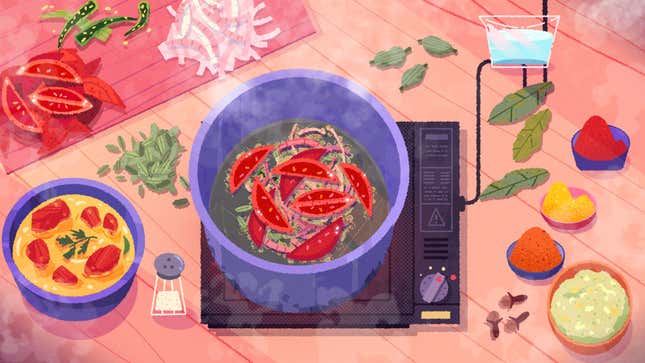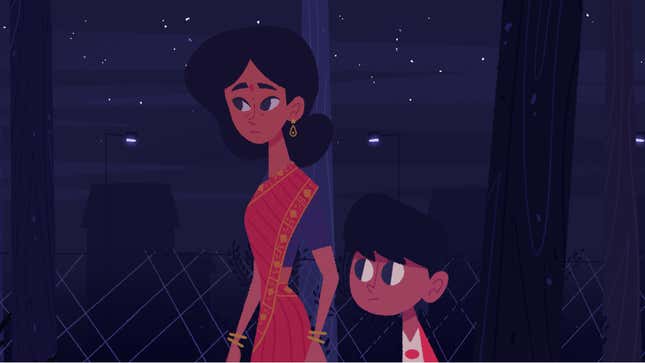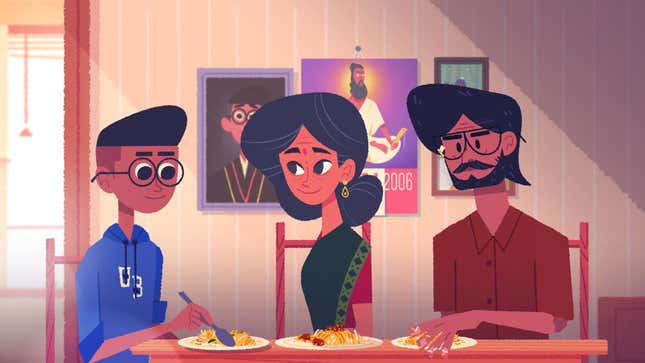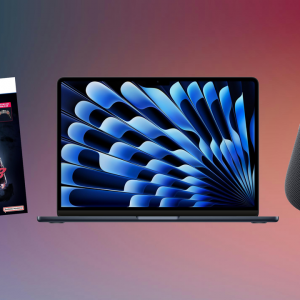On the surface, Venba, a charming cooking puzzle game in which you restore a family’s cookbook, is just that. It’s a colorful, ASMR-esque cooking game that’ll light a fire in your belly to stop ordering takeout and get busy making dishes in your own kitchen. However, after rolling the credits on the narrative puzzle game, I walked away with a thought that was even meatier than the culinary brain-teasing puzzles I’d spent the better part of three hours completing. The trial and error of cooking in Venba taught me that one must forge their own path to happiness, even if it means deviating from instructions.
Venba, developed by Visai Studios and out now on Game Pass, tells the story of an Indian woman named Venba, her husband Paavalan, and their son Kavin. The couple immigrated from India to Toronto, Canada, in the ‘80s to establish a better life for themselves. While the foreground of the game sees you making meals from Venba’s family history using her mother’s worn-out cookbook as a guide, the crux of Venba’s decade-spanning narrative centers on how the diaspora of immigration forces the family to choose between assimilation or fighting to preserve their cultural identity.
At the onset of the game, Venba and Paavalan, already in Canada, are struggling economically because their applications for jobs keep getting rejected. Matters are made all the more complicated with the birth of their son, Kavin, which forces the couple to contend with whether or not things would be easier if they cut their losses and moved back to India. Ultimately, however, the family decides to stick with living in Canada, and Venba uses her mother’s cookbook, a hallowed relic of the life she left behind, as a means to stay in touch with her proud heritage.
However, from this decision emerges a new conflict between Venba and Kavin, who would rather assimilate into North American culture by accepting the Americanized nickname of Kevin and dining on food like pizza instead of South Asian dishes out of fear of being bullied for being different like his parents. This tricky conflict manifests itself in Venba’s challenging cooking puzzles.

The majority of the game’s cooking puzzles involve a series of trial-and-error culinary dilemmas where you must make meals using Venba’s hand-me-down cookbook. It’s a task made all the more difficult because of the wear-and-tear damage the cookbook has suffered over the years.
A lot of the recipes in Venba’s family cookbook have crucial steps faded away by water damage. To overcome this, you must lean on Venba’s childhood memories of making dishes like idlis, dosas, and biryanis with her mother. If you’re stuck on a puzzle, the game has helpful tips to point you in the right direction for how to do them without completely holding your hand through them.
For example, puttu (a dish that had both Kavin’s eyes and mine light up when it was decribed as a rocket ship) requires that you layer rice and coconut shavings on top of each other before baking in a cylindrical cooker. However, Venba’s cookbook never explicitly specifies which order you do this in, and only gives you a ratio for how to layer the dish before cooking. But if you do enough trial runs (or use the game’s hint system), you’ll discover that the coconut layers need to be a couple of rice layers apart so the puttu’s consistency doesn’t cause it to topple over before it ever reaches your plate.
If you aren’t of South Asian descent, the dishes you cook in Venba may be things you’ve never heard of or had before in your life, which, in my case, only made me want to give making dishes like puttu a whirl in my own kitchen. Many of the tactile processes you perform, like straining ground rice in a colander, frying herbs and diced onions in a frying pan, and slow-cooking a pot of mutton, among others, are enough to make you wish you could smell the tantalizing aromas Venba’s kitchen has on offer. And the game’s vibrant art style conveys the pan-sizzling pops and the mouth-watering look of each dish, as well as the communal joy of cooking as a family.
While on the one hand, I found that the cultural difference between myself and its characters gave Venba’s puzzles an additional level of difficulty, it also made solving them all the more gratifying. I suspect that for many, those cultural differences will also serve as an ingenious vehicle to help players understand and empathize with the generational divide between Venba and Kavin.

Venba’s cookbook is basically her bible, in that it provides instructions meant to nourish her family while they sail the often unforgiving waves of being first-generation immigrants in Canada. For Venba, following those instructions not only serves as a way to provide for her family as they face discrimination, but it also keeps her close to the family she left behind in India.
While Venba fights tooth and nail to preserve her cultural heritage by restoring her mother’s cookbook recipes and, in so doing, bringing a little bit of India with them to Canada, Kavin is wrestling with how his roots make it harder for him to assimilate in school. Although Venba’s insistence that Kavin speak Tamil and eat South Asian cuisine comes from a place of love, Kavin sees it as ammo that bullies can use to harass him.
However, throughout the course of the game, Venba discovers that, like the faded pages of her cookbook, there are no set instructions for parenting. At the end of the day, procedural instructions on how to do things like cook a meal or anecdotal advice on how to navigate a cultural divide will only get you so far. Sooner or later, you need to figure out how to best provide for yourself, even if that means letting your son discover his own recipe for navigating life.
This theme comes to a head quite beautifully toward the finale of the game when Kavin must use his mother’s cookbook to recreate one of her meals. It’s there that he discovers a multitude of addendums to recipes made by both his late grandmother and his mother, who wants the book’s wisdom to be accessible to him even if the language isn’t. These additions include things like Venba’s mother recommending the use of towels when making idlis, as well as drawings made by Venba to help Kavin along should he wish to recreate their meals but have difficulty translating Tamil. Taken together, they form a legacy of familial love and care, a paying forward of valuable knowledge gleaned while learning, failing, and succeeding in making the meals themselves over the years. These considerate personal additions are both wholesome, and pivotal in your cooking toward the latter half of the game. But at the end of the day, it is up to Kavin to decide, through his own trial and error, whether their advice meets his own particular tastes or if he should remix their dishes to fit his liking.

Venba is one of those deceptively resonant games I’d put on par with titles like Dot’s Home and Validate in how it takes seemingly dense concepts like the cultural divide of immigration and dices it up into bite-sized chunks that are digestible for players regardless of whether or not they share the same cultural background as its characters.
Although Venba’s gameplay boils down to practice making perfect, its cooking puzzles and narrative also work together to perfectly illustrate the trials Venba’s family is facing. By pulling you into this process, it builds a bridge of empathy for players like myself, helping us relate to the loss that comes with growing apart from one’s family and the love that keeps you tethered to them while you forge your own path. Pairing that all too relatable human experience with the making of a bounty of delicious meals I’d like to try my hand at IRL is just the icing on the puttu.
Venba is out now for Xbox One, Xbox Series X/S, PlayStation 5, the Nintendo Switch, and PC.























